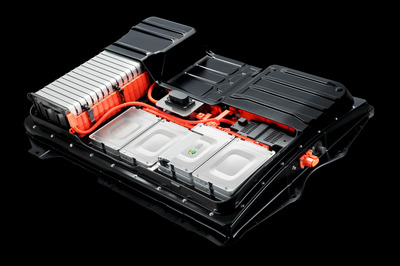ABB and partners to evaluate the re-use of the Nissan Leaf battery for commercial purposes
ABB, 4R Energy, Nissan North America (NNA) and Sumitomo Corporation of America have formed a partnership to evaluate the re-use of lithium-ion battery packs that power the Nissan Leaf, an all-electric car designed for the mass market.
The purpose is to evaluate and test the residential and commercial applications of energy storage systems or backup power sources using lithium-ion battery packs reclaimed from electric vehicles after use. Energy storage systems can store power from the grid during times of low usage and feed that electricity back into the grid during periods of peak demand, increasing grid performance and providing backup power during outages. The team plans to develop a Leaf battery storage prototype with a capacity of at least 50 kilowatt hours (kWh), enough to supply 15 average homes with electricity for two hours.

“The agreement will allow us to evaluate the commercial viability of a grid storage solution and develop a prototype to effectively re-use Nissan Leaf batteries,” said Bruno Melles, head of ABB’s Medium Voltage power products business. “We look forward to working with our partners to take electric vehicle battery energy storage technology a step further.
“Electric vehicle batteries have longer lives than those of personal computers or mobile phones, with up to 70% capacity remaining after 10 years of use in an automotive application. This longevity allows them to be used beyond the lifetime of the vehicle for applications such as a smart-grid community energy management system or battery energy storage.
“It’s important to Nissan that we manage the complete life cycle of the electric vehicle battery pack, even beyond its use in a Nissan car,” said Ken Srebnik, Senior Manager, NNA Corporate Planning.
“Innovations in energy storage systems are becoming more viable as the electric grid gets smarter, and Nissan is proud to work with ABB, 4R Energy and Sumitomo to help bring these possibilities to market.”
Innovative energy storage solutions are expected to become a key component of the smart grid, contributing to greater efficiency, reliability and performance. They will facilitate further integration of renewable energy sources, such as wind and solar, into the grid. The evaluation of Nissan batteries, through the partnership, will help determine their suitability for the power industry as a cost-effective energy storage solution.
Kazuaki Mori, Director of International Business Development Division for 4R Energy, said the company was happy to be partnering with the others in developing the business model for the re-use of the batteries.
“We want to contribute to the establishment of a low-carbon society with renewable energy resources and the next generation of Smart-Grid and EV communities in the world,” he said.
NSW to exceed energy storage targets
The state government has awarded contracts for six new long‑duration battery projects to...
Novel energy storage system to decarbonise buildings
Researchers have designed a novel energy storage system that charges from surplus renewable power...
Non-destructive solar cell monitoring technique discovered
UNSW researchers can now monitor solar cells at a microscopic level while they are operating to...








